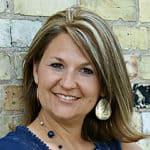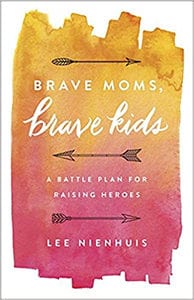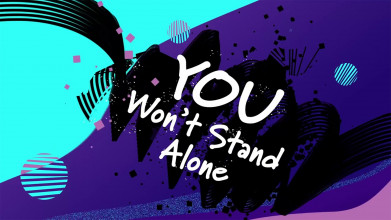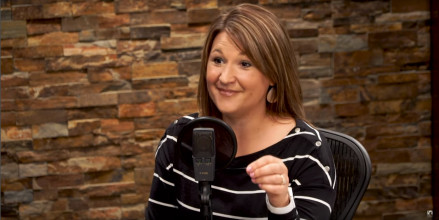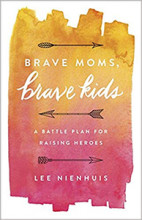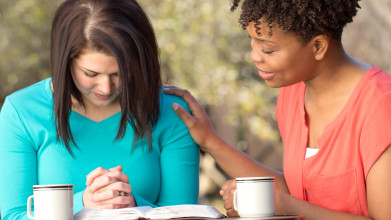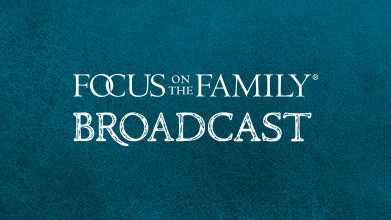Opening:
Teaser:
Woman #1: As a mom, I’m just really worried that I’m gonna do something to mess up my children.
Woman #2: My biggest fear, especially as a single mom, is being able to be everything for my daughter – everything she needs.
Woman #3: As a mom of younger kids, I have a fear of them getting hurt or bad things happening.
Woman #4: I’m really scared that no matter how hard we try, our kids might still walk away from the faith.
End of Teaser
John Fuller: Well, it might be that you resonate with some of those fears that many moms seem to struggle with. And today on Focus on the Family, we’re gonna help you to overcome those fears, be a brave mom so you can raise kids who are brave heroes for Christ. Your host is Focus president and author Jim Daly. And I’m John Fuller.
Jim Daly: John, I don’t know about you, but I remember when I was a kid putting on that towel with a clothespin and playing Batman, Superman. I was trying to be a superhero.
John: Did you ever jump off the roof or anything?
Jim: No, I never did that. That wouldn’t be too smart. No.
John: (Laughter).
Jim: But I’d ran through the alleys looking for, you know, evil to conquer. And that’s just what little boys and little girls do. I mean, we’re looking to right the wrongs, right?
John: Mmm hmm.
Jim: And, uh, it’s what, hopefully, our little hearts gravitate toward. But as we get older and become parents, we – we do realize how dangerous the world can be. It becomes much more real. Uh, instead of running around the yard, we’re now hollering at our kids, “Be careful. Don’t do that. Where’s your helmet?”
John: “And put that bath towel back.”
Jim: “And put that towel back because you could trip on it, and then you wouldn’t be a superhero anymore.” That’s the idea.
As parents, we know this, uh, coming generation needs strong heroes for Jesus. Every generation does. But, uh, to be brave warriors, we need to become brave warriors. And I’m excited to talk with our guest today, who will, uh, illuminate this for us. And I like this – Psalm 56 where David says, “When I am afraid, I put my trust in God. What can mere mortals do to me?” And I think that is the theme of today.
John: Yeah, that really catches me – mere mortals.
Jim: Yeah.
John: Our guest today, Lee Nienhuis, is a wife and a mom. She has four kids, ages 8 through 14. She has struggled with some fears of her own. We’re gonna hear about those today. And she’s a speaker and a coordinator for moms in Prayer International. Uh, her book is called Brave Moms, Brave Kids: A Battle Plan For Raising Heroes. And of course, we have that at focusonthefamily.com/broadcast.
Body:
Jim: Lee, welcome to Focus on the Family.
Lee Nienhuis: It’s so good to be here with you today.
Jim: So how do we as parents – I mean, you were sitting there, watching your son sing in church one day when you realized the Catch-22 we have as Christian parents – maybe this is the crux of the issue – you want them to be that superhero. You want them to go out there and right the wrongs of the world at the age-appropriate way. And then you start thinking, “Wow, that could be dangerous.”
Lee: Oh, yeah. My son Ryan was in church. And you know, we’re all lined up in the pew – four kids – and so all within arm’s reach, you know, so that you can keep them in line.
Jim: That’s critically important (laughter).
Lee: Yes – just so you can grab them by the back of the neck in case they’re not behaving. But we were singing I Have Decided To Follow Jesus. And I love that song, first of all. But I was wrestling with fear of what was going on in our political scene, in what was happening in the world around us. And it was an internal wrestle. And I heard him with his little bitty voice, singing, “I have decided to follow Jesus.” And I was like, “Yes, Lord.” And I knew – I mean, he was just singing with such exuberance. I knew that everybody around us was laughing, too, ’cause they could hear him. And then he sang, “No turning back, no turning back.” And I was like, “Oh.” And then it says, “The cross before me, the world behind me.” And all a sudden, it took on a totally different meaning.
Jim: Fear was gripping you.
Lee: That – that – there was a cross before my son. And I can sing that with boldness on a good day, but my child singing that left me just reeling – like, “Lord, is that really what I want?” And here I’ve been praying for their whole lives that they would follow Jesus. But in that moment, I just was like, “What have I been praying, and what is he going to experience as a Christ follower?”
Jim: Right, and to fill that out, what were you fearful of? What was your imagination taking you to?
John: Oh, yeah.
Lee: I – I think that really has depended on what’s been going on in the environment around us, in the news around us.
Jim: Oh, sure.
Lee: At – at the time, it was the last election season. I – I mean, those come around every four years to terrify us all, you know, and two years before that leading up to it. But it was also a time of earthquakes and hurricanes. And the world feels like, in some ways, it’s spinning up. School shootings are happening on the regular now, and so we’re only a month or two away from any fear. But really, it has been religious persecution that had been a trigger point for me, and I recognize that it’s becoming harder for us to live as Christ followers even here in America. And I think that’s what I was imagining for my son Ryan.
Jim: Yeah. If we wound the clock back, uh, when you and your husband were first married and thinking about kids – so you haven’t had the children yet. You prayed they would be heroes for Christ. So let’s start there. What defines a hero?
Lee: Well, actually, I was praying that my kids would come to know Jesus as savior and Lord…
Jim: Mmm hmm.
Lee: …Because I really was beginning to see that having a child wasn’t about just having somebody who looked like us…
Jim: Right.
Lee: …But actually raising someone to know and love Jesus, to bring him glory in each generation until he returns. And so that was our prayer. We didn’t know to pray anything except, “Lord, get ’em saved” – basically, help them come to know Jesus. And then when my son was 4 years old, on the side of a cherry orchard, he said, “Mom, I want to go to heaven someday.” And I was like, “That’s great. Do you know how that works?” And so I was able to lead him to the Lord. That night when Mike and I got into bed together, that time where we had prayed strategically that our kid would come to know Jesus as savior – that night, I laid in bed, and I thought, “Well, now what are we going to be praying? Like, we’ve prayed that they would come to know Jesus, and he has” – you know?
Jim: Right.
Lee: And…
Jim: Now he has to live for him.
Lee: “Now what do we want?”
Jim: Yeah.
Lee: And so that’s when, out loud, verbally, we started to say, “So what do we really want our child to become?” And that’s when the hero prayer started. So I want kids who will be warriors in Christ’s kingdom in this generation – not somebody who merely goes to church and checks the boxes, but someone who really believes that their life is worth giving over to a Lord who died to save them.
Jim: Well, I want to continue to dig in that area. There’s going to be people listening where they’ve had trauma with their kids. Their kids have been injured. And they’ve probably, from that day forward, have asked that question – why, God, why did that happen? And I wanna continue to develop this before we tackle that big question. You had a situation, and you mentioned it in the opening, where school shootings are more commonplace. Uh, kids are practicing that with teachers, administrators now. It’s what most schools have to go through. If there is a situation like that, where do I go? And kids, here’s where you go. That kind of got your attention, too, right? What happened in that context when one of your kids had a shooter drill?
Lee: Oh, yeah. It was the first time that they had an active shooter drill. And I didn’t even know that term existed. I grew up right here in Colorado. And so, you know, we did tornado drills. But active shooter drill was a new phrase. And to hear it come out of the mouth of my child was startling.
Jim: Yeah.
Lee: So he came home and he said, “We practiced an active shooter drill today.” And so as good parents, we practice I’m-not-surprised face, right? Like that, oh. I just said, “Oh, tell me about that.” And he said, “Well, we pile up in the corner like puppies, and we hide.” And I could barely keep it together and not turn away with just tears in my eyes and say, “You pile up like puppies because someone could actually come into your school and shoot people.” I mean, Sandy Hook had just happened. And I was like, what kind of evil goes into schools…
Jim: Right.
Lee: …And does this to children? And – and that was startling. I would like to report to you that active shooter drills have changed in the years that have followed. And I – now they come home every year and say that – “We practiced active shooter drills.” And so I say the same thing – “Tell me about that.” And this year they said, “Well, we jump out windows.”
Jim: Right.
Lee: Because they’re on the first – “We jump out the windows.” And he said, “If someone gets into our classes, now we don’t pile up like puppies; we throw things and we fight back.” And I was like – I mean, the reality is – is that is startling. But at the same time, it’s like, I had the opportunity to say, “No, Ryan, I want you to throw things. I want you to jump out the window. I want you to do everything that they say to do. But I want you to start praying in that moment, Lord, you are here in the middle of this with me. In Jesus’ name, protect us.”
Jim: Yeah.
Lee: “In Jesus’ name.”
That’s what we do as brave moms, is we look back at these terrifying situations that our children should not be placed in – we say, “Lord” – we teach them to say, “Lord, show up for me in this moment.”
Jim: Right, no matter the circumstances.
Lee: No matter. You are my hiding place. Protect me.
Jim: Yeah.
Lee: That’s my job.
Jim: Yeah.
Lee: To train them in that. Otherwise, I just sit there and go, active shooter drills – that’s terrifying.
Jim: Yeah. No, that’s so good, Lee. Um, many moms are going to resonate, I think, with this next question, uh, a fear that you’ve struggled with as a mom of not being enough. I mean, that’s a woman’s temperament. I think most women struggle with that – I’m not enough, and then fill in the blank. So in this area of being a mom and wanting to have brave, spiritual kids, how do you fall short or what’s your fear of falling short in that way? How are you not enough?
Lee: In any number of ways. As well as I’m trying to do this mothering thing, as well as Mike is parenting, too – I mean, fortunately for us, in our home, we have two parents that love and follow Jesus and who are bent towards discipling them. But I know that there are listeners who are single moms, too, who are in this and…
Jim: Sure, and single dads.
Lee: And – and single dads. And – and here’s the truth – we’re not enough. There are going to be holes. I have a red mug that’s on my dryer, and I call that their counseling fund for when they get older. You know, it comes…
Jim: (Laughter) You better move to a bucket.
Lee: The change, the spare change that falls out of their clothes, you know, I put that in that bucket. I say, “That’s for your counseling fund.” Because we’re not enough.
Jim: Right.
Lee: I mean, we’re gonna do our best to raise our children biblically, to raise them to know and love and serve the Lord Jesus. But he is enough for them when we could never be.
John: Well, this is Focus on the Family with Lee Nienhuis. And she’s got this great book, Brave Moms, Brave Kids: A Battle Plan For Raising Heroes. We want to encourage you to get a copy of today’s conversation and to get a copy of the book, obviously. And you can do so at focusonthefamily.com/broadcast or call 800, the letter A and the word family.
Jim: Lee, we’ve talked about your fears with your son, but you have some unique worries about your daughter as well. You have a very insightful story about body image. What was that?
Lee: Hmm. It’s tough to be a girl in this society with the messages that are coming in. And I recognized that I was modeling something to my daughter about who she is, when one day we were running behind, and I said to her, “Um, Lexie Beth, I need you to hurry up and get into the shower. And we – it’s time for us to leave.” And she said, “Hold on, Mama.” And she pulled the scale out of my bathroom closet, took off all of her clothes, pulled out her hair tie, shook out her hair and stepped onto the scale and weighed herself, and then she got into the shower. And I was like, well, what was that? And very quickly, I realized that’s my routine before I get into the shower every day. And I saw that, at 6 years old, she had just weighed herself and gotten – this girl doesn’t have an ounce of fat on her body. And that shouldn’t even be crossing her mind. I was just modeling something…
Jim: Sure, she’s picking up your cues.
Lee: …For her that – oh, my goodness, once it happened, I was like, what am I doing to my girl?
Jim: So what’d you do? I mean, how did you talk with her about that? What…
John: You threw away the scale, right?
Jim: Yeah.
Lee: I wish I could say I threw away the scale.
Jim: (Laughter).
Lee: I – I needed to deal with that first as a mother.
Jim: Yeah.
Lee: Where is my identity in the middle of this? Is it my weight? What am I dealing with in my mom mind? But I also was able to say, “Lexie Beth, this is not about how much you weigh. Like, honey, you don’t need to do that.” But then I felt all those fingers coming back at me.
Jim: Right (laughter). “Honey – Honey, you don’t need to do that.”
Lee: You know, like, “Honey you don’t need to do this…”
Jim: Yeah, I could see that.
Lee: “…Every – every week, every day.” And I also just said, “This is not about what you look like on the outside; this is about who you are on the inside. That is what’s going to make you beautiful. That is what’s going to need to define who you are.” And now, as they’ve grown into teenage girls, that’s perhaps even more so.
Jim: Yeah, absolutely. Uh, Lee, you use an acronym in Brave Moms, Brave Kids that I think – again, I’m just trying to feel this for how my wife Jean would feel this. And I think most husbands, you should be doing that right now. How would my wife be resonating with this content? Your acronym BRAVE I think is a great illustration for women, and moms obviously, to understand quickly what is most important. So let’s go through that. The B is believe God. Uh, you’ve struggled with that when it comes to your daughter. You’ve just expressed that. But also your daughter has special needs. So that adds even another layer of anxiety for you. God, are you really gonna be able to take care of her? Why don’t you describe, to the level of your comfort, that situation and how, B, believe in God, in that acronym BRAVE, challenges you?
Lee: Well, my other daughter, Gabriella, has special needs. And that is – it was hard when they were little, she was little, and we didn’t know what that would look like for her. There was a time when I didn’t even know if she would speak. She was 18 months old, and we were just really starting to recognize there’s something going on underneath, and we don’t know how to put our finger on it. And as we began to learn more, spend time with doctors, we – I just thought, like, Lord, where’s the trajectory of this going to go with my daughter? What’s her life going to look like? I had no idea. You can’t know when you’re holding a toddler who can’t talk what this is gonna look like. And now she’s 14 years old, and we’re dealing with some of those – still special needs, but we’re dealing with them at a totally different level now that she’s a teenager. Life looks different for her. She’s in a public middle school. She’s making friends, playing basketball, doing all these things. And – and – and so the fears change. And I still wonder sometimes about the trajectory but, B, believe God, is not just, believe that there is a God, but believe the promises that he has given to our children, which, for me, is, he is always with them.
Jim: Yeah.
Lee: He is their helper. Hebrews 13:5 says, “He is their helper. They do not need to be afraid.” And I don’t mean to be afraid for them. I have to believe all the things that he says that he’s going to be – enough, sufficient, their defender, their shield.
Jim: Yeah.
Lee: And so really, B is the hinge point for moms and dads, as they start to move forward in courage, is, do I believe that – that Jesus died for them? Yes. But do I believe that he is actively, presently working in their lives? That’s the question I need to ask them.
Jim: Yeah. I mean, it’s so good. At a cultural level, I – I remember having a discussion with a friend of mine who is not a Christian. And he said to me, “You know, I get really worried when you Christians are really worried because if you’re worried, I need to be worried.” And that’s applicable to our children, isn’t it? When they see us full of anxiety, full of fear about whatever it is, that communicates something to them about faith.
Lee: Right. And they have to see us needing God for something.
Jim: Yeah. That’s good. So that’s B. R is for reflect in the acronym BRAVE. I’m gonna keep repeating that for people bouncing…
Lee: Yep.
Jim: …In and out of listening to us. What is reflect? What does that mean?
Lee: So reflect is spending time asking questions about where our children are in the middle of their developmental and spiritual growth process.
Jim: But you even take notes. I was really impressed with that.
John: Yeah.
Lee: Oh, I do. Yeah.
John: (Laughter).
Jim: You do it like a student, which I hated taking notes in college and high school because I’m an auditory learner. But I’m – I’m really engaged with noticing where my children are at. I mean, I was the one that noticed they needed glasses at 2, 3 years old because they were watching television in a weird way – right? – that kind of thing.
Lee: Right.
Jim: But you – you’re taking notes and being that, uh, proactive in knowing your children.
Lee: Well, I want to be honest and just say that there is a time that I set my son up on the counter and because he’s – I said, “You need to hurry up. We’re going. I need you to get your shoes on. Tie your shoes and get in the car.” And he looked at me and he said, “I can’t tie my shoes.” And that should have been no big deal at age, like, 7. And I said, “What do you mean you don’t know how to tie your shoes?” And he said, “Velcro.”
Jim: Right, exactly.
(LAUGHTER)
Lee: And I was like, “What?” You know?
Jim: We had – that’s pretty normal today, actually. I noticed that.
Lee: I mean, he’s wearing Velcro shoes and…
Jim: (Laughter).
Lee: Of course. But he also said, “But Mom, if I need my shoes tied, we’re always in a hurry. So my brothers and sisters tie them for me, or you tie them for me.” And I realized I haven’t taught my son how to tie his shoes. First of all, what are his teachers thinking at school?
Jim: Yeah. Right.
(LAUGHTER)
Lee: But also, like, it’s so easy to miss things because we’re in the process as parents of just doing the next thing, you know, surviving this. And so reflection is really important. Intentionally asking ourselves about the developmental process, spiritually, emotionally, physically, of our kids at all times. And for me, I call this my quarterly review. So I try to, every four months, I go out with Mike. We print a list of the questions that I ask. They’re in the book. They’re on my website. But I print the list of questions, and we have a date night, and we try to focus on the kids and ask, like, “Who are their best friends right now? Who is involved in their life right now? How can I encourage them?”
Jim: And that is good. I mean – and that’s being engaged.
John: Yeah.
Lee: Right.
Jim: Or reflecting what’s happening with your kids. All right, the A in the acronym BRAVE is ask forgiveness. That’s a good one.
Lee: Right.
Jim: But it’s a hard one.
Lee: It is. There are no perfect parents.
Jim: Really?
Lee: Right.
Jim: I thought John was a perfect parent (laughter).
John: I think I’ve made that pretty clear – I’m not (laughter).
Jim: So asking for…
John: I think we’ve heard that that’s not true.
Jim: Let’s dig in. Give us your juicy asking-for-forgiveness-as-a-parent example.
(LAUGHTER)
Lee: Uh, which one, right?
John: Within the past week or so, you know.
Jim: Yeah, just pick one.
Lee: Right. So there are no perfect parents. If we take ourselves off the hook from that – I think that parents think that it’s weakness to admit to their kids that they just had a wrong encounter with them or their response was incorrect. But actually, in the kingdom of God, our humility is our strength. And so what we’re looking to do is to create an atmosphere in our homes where it’s OK to fail and come back again.
Jim: It’s so critical.
Lee: So at the kitchen table at night – not every night, but occasionally – we go around and we say, “What was the high of the day? What was the low of the day?”
Jim: (Laughter) Yeah. Right.
Lee: I mean, like, we’re pulling the stuff out of our teenagers. But also, “What mistake did you make today?” And Mike and I go first.
Jim: Yeah.
Lee: I mean, we need to be the first ones to go, “What I did, what I said was not kind. And I am sorry.” Because when moms and dads say, “I’m sorry,” then it’s OK for them to say, “Hey, I messed up, and I need you to forgive me or help me.” That’s what I’m looking for.
Jim: Good modeling, though. V in BRAVE – what’s V for?
Lee: Vigilant prayer. Pray like it depends on you.
Jim: Now, you sound like you’ve done that all your life, but that was a learning process for you, wasn’t it?
Lee: Yeah.
Jim: OK, give us that (laughter).
Lee: Yeah. I – I knew that prayer was important. And even though I’ve been a student of the word for 20-some years, prayer felt like an area of defeat in my life. And I work with Moms In Prayer International for five years now. And I learned that most women feel, most men feel incompetent in the area of prayer. We put such a focus on it, but we don’t ever teach how to do that.
Jim: What – in fact, you’re at a woman’s event, and your friend, who you looked up to and you thought was this prayer warrior, when the person onstage said, “How many of you have a prayer warrior attitude?” she didn’t put her hand up and neither did you and many other women.
Lee: Yeah. I don’t know anybody who’s gonna, like, “I’m a prayer warrior.”
Jim: (Laughter) Right.
Lee: “Pick me,” you know? Like, “Let me jump up there.” Because there’s always room for growth. But when it comes to our kids, we can’t bank on anybody else praying for them. And no one knows your child like you do.
Jim: Right.
Lee: I mean, as moms, we know when a freckle grows on their skin, you know?
Jim: Yeah.
Lee: Like, we’re paying that close of attention. We can ask God for the details of their lives better than anyone else can.
Jim: And we’ve got to give the E so it’s not BRAV.
(LAUGHTER)
Jim: So BRAVE.
Lee: Thank you.
Jim: What is the E?
Lee: E is equip them. We…
Jim: And how does that – what does that look like? That’s a big one.
Lee: We have to decide that this is our job. That it’s our job – not our youth pastor’s job, not their teacher’s job – it’s our job to teach them what following Jesus looks like in this generation. And so there are some critical things that we need to teach them.
Jim: Yeah.
Jim: In fact, Lee, you have a story – you and your daughter were on a wilderness race of some sort. What happened and how did that, uh, equip her?
Lee: Well, our family was running a 5K together.
Jim: OK, I’m out of here.
(LAUGHTER)
John: I’ve never done it. Well-done.
Jim: Good for you.
Lee: I said, “We ran.” I didn’t say, “We running – or we’re running now,” you know.
Jim: That’s OK. Anything with the word ran in it is really impressive.
(LAUGHTER)
Lee: Well, we woke up early in the morning, and it was my husband, my son, and Lexie Beth and I.
Jim: (Laughter) OK.
Lee: And you just need to know – Lexie Beth ran three miles at 3 years old in flip flops.
Jim: Wow.
Lee: I really think she’s like Eric Liddell.
John: One of those naturals, yeah.
Lee: Like, she was just born to run. She likes it. I think it’s torture. So…
Jim: Right. I’m with you (laughter).
Lee: So we started running. And I knew that we were safe enough on this course to let her just run. And there’s not very often, as parents with young kids, where you’re like, “It’s safe. You just do what you’re gonna do.” But we were with friends and family. It was fine. And so we started out, and I just said, “You run till the end, babe. You run.” And that was so fun. My husband has a bad knee, but he was running with our son, who’s actually older than Lexie. And so we were running in three phases. I was at the back end of the race. And so I couldn’t see her for most of the race. I could barely see my husband and my son running. But there was this place on the trail where there was a switch back, and I was able to watch Lexie round the corner of the trail and start to head to this hill that looked like a wall. I mean, just this huge incline. And I could watch her dig in and lean into that hill and push. And I remember being on that hill, praying, watching her climb something that I was like, why would they ever put us on that hill, you know? And I had the opportunity to pray her into it, knowing that I would be there, too, but at a different time, and that she was running this race of her own. And we got to the end of that trail. I watched my husband and son hit that trail. And it really just sang in my heart that there is a time where they run right beside us, and there is a time when we’re going to have to cut the ties and let them run into the future on their own, trusting that the Lord is with them, and that what we have left to do for them is to pray for them as they lean in and run their own race.
Jim: That’s beautiful. What a great analogy.
Lee: Well, running has all kinds of analogies, doesn’t it?
Jim: (Laughter).
John: That’s true.
Lee: I think that’s why Paul says, “Run the race before us.” It’s just such a tangible thing.
Closing:
Jim: Well, and, again, that’s what makes that acronym, BRAVE, so good. And we’ll post that on the website, John.
John: Yep.
Jim: And Lee, man, this has been good stuff. I hope people get a hold of your book, Brave Moms, Brave Kids. You can certainly do it right here through Focus on the Family. And in a way, uh, we’re doing something, Lee, that I think ties into what you’re talking about here. It’s a practical example. We do something every year in October called Bring Your Bible to School. And we want to kind of tie this in because parents and kids can do this together as a team. And we’ve had, uh, over 700,000 kids participate last year, and we’re hoping for more this year. Thirty-five percent of public schools are represented of kids, uh, taking their Bible to school. It’s something they can do. It’s not, uh – it’s constitutionally given that you can do that. They can’t take that right away from you. And it’s just a way for you to express your faith in God and your hope in Christ, and you can do it in a public place.
John: Yeah, it’s not confrontational.
Jim: Yeah.
John: It’s a very good, proactive way to say, “I’m a believer, and, uh, I’m not afraid, I’m not ashamed of the gospel. And I’m gonna bring my Bible to school.” We’re gonna have details about Bring Your Bible to School Day on our website, and of course we’ll have the book by Lee Nienhuis. It’s called Brave Moms, Brave Kids. It’s a great book, as you’ve heard today. Get a copy of that, and, uh, make a donation if you can. Your gift of $40 equips ten students to participate in things like Bring Your Bible to School and to live out bodly their faith in Christ. so please, consider that when you get in touch. Our website – focusonthefamily.com/broadcast. Our phone number – 800, the letter A and the word FAMILY. 800-232-6459.
Lee, thanks for being with us.
Lee: It’s been so good to be with you guys.
John: Coming up next time on this broadcast how a burned out but successful businessman decided to follow Jesus Christ.
Teaser:
Terry Looper: The problem was, I was unwilling to sacrifice my new relationship with my wife and my daughters and my new relationship with The Lord to make money.
End of Teaser











